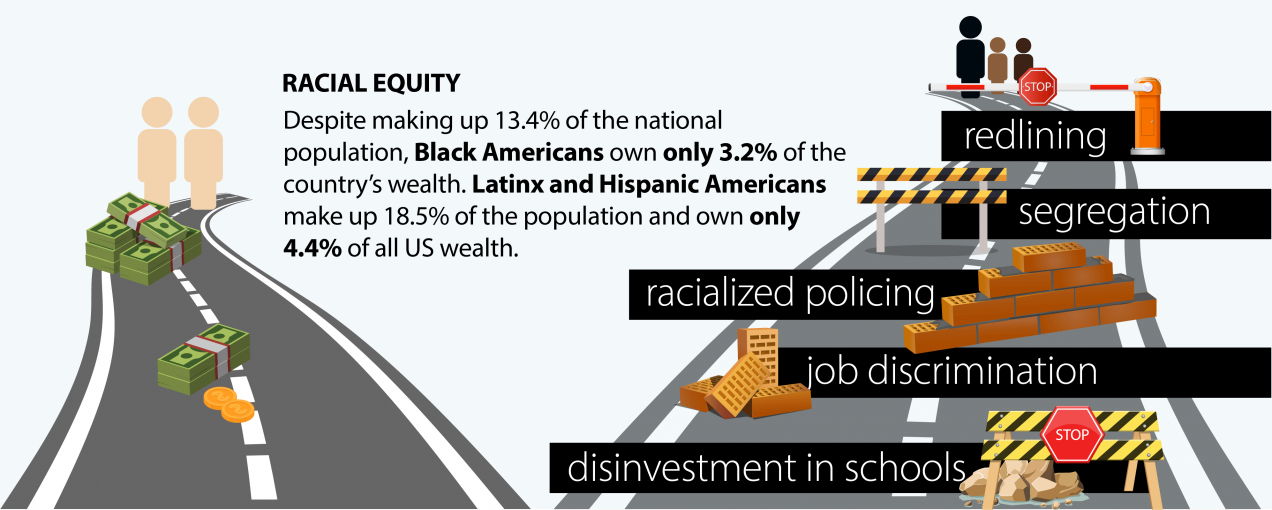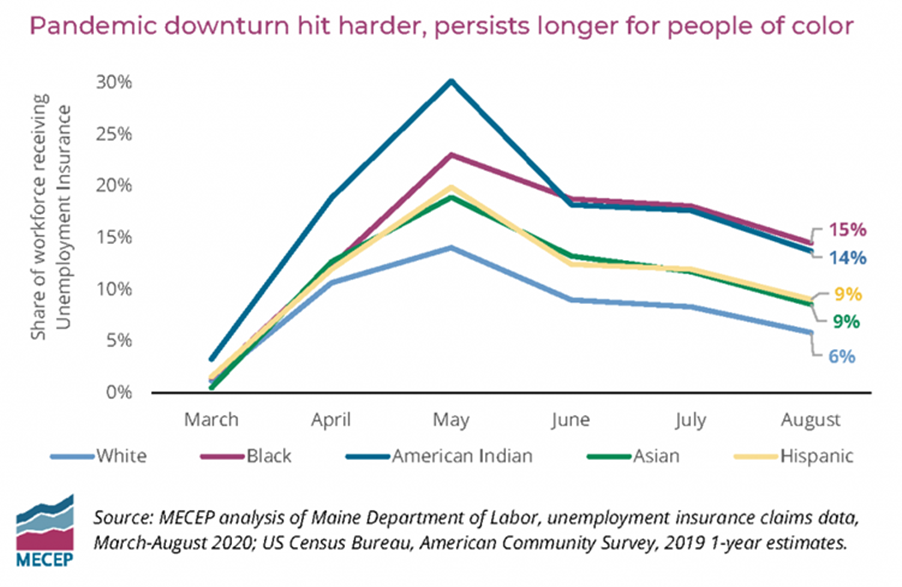Racial Equity
By mid-2020 it was reported that Maine held the infamous distinction of having the largest racial disparity for COVID-19 in the nation. Black and African American Mainers were contracting COVID-19 at 20 times the rate of white Mainers.
The extremely disparate impact of the disease on Black, Indigenous, and People of Color (BIPOC) in Maine has laid bare the inequities in our institutions, systems, and structures that are not new. Clear disparities in employment, education, health care, housing, and law enforcement, along with other systemic factors have contributed to the disparate impact of COVID-19 here in Maine. We cannot address COVID-19 related disparities without also addressing these systems. We must come together to tackle systemic racism so that we can move toward a more just and equitable Maine.

Across the country, local and state leaders are declaring racism a public health crisis or emergency. These declarations are an important first step in the movement to advance racial equity and justice and must be followed by an allocation of resources, strategic action, and direct investment into the most impacted communities. We must advance solutions that target and work to shrink disparities in all the areas where they exist.

We support the following guiding principles for combating systemic racism put forth by the Permanent Commission on the Status of Racial, Indigenous and Maine Tribal Populations in its September 2020 report to the Maine State Legislature:
Policymaking must be driven by a set of guiding principles that keeps structural racism central in lawmakers’ minds Namely, that:
- building awareness takes resources;
- awareness alone is not enough;
- financial and human resources must be allocated;
- policies that are ‘race-neutral’ will ultimately maintain existing disparities;
- an adequate response requires a structural analysis;
- developing solutions should be led by impacted communities; and
- policies that affect tribal nations in Maine must be enacted in a government-to-government relationship.
With the guiding principles in mind, policymakers must prioritize action that will:
- invest in communities by building infrastructure and allowing for self-determination;
- allocate resources and establish systems necessary to address health disparities;
- target the opioid crisis to address strain on tribal communities;
- take a bolder approach to criminal justice reform;
- reduce the particular barriers immigrants face to economic security and opportunity;
- incorporate education about racial equity in schools; and
- foster institutional change within government through mandatory trainings for public officials on implicit bias and systemic racism and by requiring racial impact assessments on legislation and regulations.
What you can do...
The Permanent Commission on the Status of Racial, Indigenous and Maine Tribal Populations was created by the Maine Legislature in 2019. It is tasked with forwarding “programs that create and improve opportunities and incorporate the goal of eliminating disparities for historically disadvantaged racial, indigenous and tribal populations in Maine.” In 2020, the Permanent Commission issued a report that sets forth guiding principles for addressing structural racism through lawmaking embraced here and identified priorities.
If you would like to learn more about the Commission and its work you can contact Cameron Brewer at cameron.brewer@voanne.org.
The Maine Coalition on Racial Equity (CORE) is made up of nonpartisan, nonprofit, non-governmental organizations committed to advancing racial equity and justice in Maine. CORE seeks to achieve this through:
- Legislative education and trainings, building a shared understanding and knowledge among Maine lawmakers and legislative staff of racial inequities intentionally and unintentionally built into our systems, policies, and laws; with the goal of dismantling structural inequities and disparities;
- Advocacy and government accountability, with the goal of achieving structural changes through legislation and funding allocation; and ensuring the accountability of executive agencies once laws and policies are in place; and
- Community engagement, with the goal of centering individuals and communities most directly impacted by structural inequities and disparities, and ensuring they are centered and called upon in the processes to dismantle and correct policy and political harm.
You can contact Joby Thoyalil at jthoyalil@mejp.org to learn more about CORE and LD 2 and how to get involved.
The Wabanaki Alliance and allies are working to pass important legislation to establish tribal sovereignty in Maine. State legislators are considering LD 1626, a bill to protect Wabanaki rights by restoring tribal self-government to tribes in Maine. Based on consensus recommendations from a bipartisan task force convened by the Maine Legislature, the legislation addresses long-standing issues with a land claims act passed in 1980 that governs the relationship between the state and the tribes in Maine. Learn more about the history that led to this legislation, why it’s needed, and how you can support these efforts in the Wabanaki Alliance’s Take Action Toolkit.
